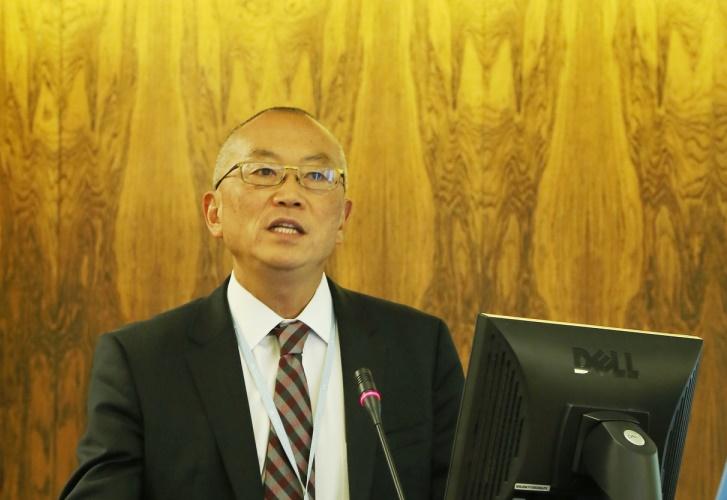A joint mission between the World Health Organization (WHO) and South Korean health officials to probe a MERS-CoV outbreak triggered by an infected traveler said the event is large and complex, but noted that the pattern resembles similar hospital-linked outbreaks in the Middle East.
The outbreak, which began with a single infected traveler in the middle of May, showed another spike in cases and deaths today, as South Korean health officials reported 12 more infections and 3 more deaths that boost the total to 138 illnesses, 14 of them fatal.
The closely watched event has shown how quickly MERS-CoV (Middle East respiratory syndrome coronavirus) can spread, even in a developed nation's best hospitals.
South Korea's surge of cases has raised worries about possible changes in the virus, but the joint mission said infection control lapses have played a role in the spread and that so far early gene sequencing studies have not found changes that would make the virus more transmissible.
Joint mission findings
An expert team from the WHO arrived in South Korea on Jun 10 for the 4-day joint mission and released its findings today at a media briefing and in joint statements posted on the WHO and South Korean health ministry Web site.
Keiji Fukuda, MD, who co-led the mission and is the WHO's assistant director-general for health security, said in a statement that so far the outbreak has been centered around health facilities and is not circulating in the community. "However, continued monitoring for this is critical," he said.
In its written findings, the team said the outbreak was amplified by infections in hospitals and movement of sick patients between hospitals. They added that although both new and older cases continue to be reported, the epidemic appears to be declining as the effects of stronger control measures take hold. "However, several weeks will be required to confirm the impact of the measures and whether the outbreak is fully controlled," they wrote.
One of the factors that contributed to the spread of the virus was that the country didn't expect to see MERS-CoV and doctors were unfamiliar with the disease, according to the report. Hospital infection prevention and control measures weren't optimal, and extremely crowded emergency departments and multi-bed rooms played large roles in nosocomial spread at some hospitals.
Two factors may have fueled the quick spread of MERS-CoV, the team said: seeking care at multiple health facilities ("doctor shopping") and having many family members and friends visiting patients on medical wards, increasing the number of contacts and adding to secondary spread.
The quick spread of the virus and the fact that it has so far been contained to hospitals has raised questions about what else might be contributing to transmission, especially because experts still aren't sure how MERS-CoV spreads between humans.
Joint mission members wrote that it's too early draw strong conclusions about other factors. They added that although the outbreak's profile resembles hospital-based ones in the Middle East, the investigation in South Korea so far hasn't been able to determine if environmental contamination, inadequate ventilation, or other factors played a role.
"There is a compelling need for further investigation," they wrote.
Recommended steps
The group made 11 main recommendations, many of which revolve around shoring up infection control practices at hospitals and screening patients with fever and respiratory symptoms.
Though the outbreak itself is complex, the most important steps to control the outbreak are basic public health measures, the experts said. They include early and thorough identification of all contacts, strong isolation and monitoring of contacts and suspected cases, fully implemented infection prevention and control practices, and barring infected people and contacts from traveling.
Other recommendations included additional staff to provide surge capacity, risk communications improvements, and designating certain hospitals for triage and assessment of suspected MERS cases.
The team also asked South Korea to consider increasing the number of negative-pressure rooms at its hospitals, to take steps to decrease "doctor shopping," and to train more infectious disease, infection control, and public health specialists.
Latest cases and deaths
South Korea's health ministry today announced 12 new MERS-CoV cases, which include an ambulance driver who transported two earlier reported patients, Yonhap New reported. The surge of new cases comes 1 day after the country reported 4 cases, which had raised hopes that the pace of newly reported infections was slowing.
In addition, 3 more deaths were reported, according to separate Yonhap reports, bringing the total to 14. They involve a 67-year-old woman with underlying health conditions and two men 73 and 78 years old who were had contact in May with a MERS patient.
WHO sets date for emergency committee meeting
The WHO's MERS-CoV emergency committee will meet on Jun 16 to discuss new developments and possibly recommend new steps for curbing the spread of the virus, the WHO said today in a notice e-mailed to journalists.
In its ninth meeting since the virus was first detected in humans in 2012, committee members will meet by teleconference.
At its last meeting in February, the emergency committee concluded that the conditions for a public health emergency of international concern hadn't met the criteria set by International Health Regulations. The panel noted, however, that the threat of international spread of the virus remained concerning.
See also:
Jun 13 WHO press release
Jun 13 WHO joint mission high-level messages
Jun 13 Yonhap News story on 12 new cases
Jun 12 Yonhap News story on additional MERS deaths




















